The Bible offers countless verses that inspire believers to walk in boldness and face challenges with unwavering courage. Both the Old Testament and the New Testament feature scripture quotes that teach us the virtue of boldness as a trait to be admired.
These biblical references encourage us to speak and act boldly, proclaiming our faith even in the face of opposition. It is through these Bible verses that we can discover the meaning and significance of boldness in the life of a Christian.
When we read the Bible, we come across examples of people who exhibited remarkable boldness. These individuals were courageous, acting in faith and following God’s command to live out their purpose.
As Dr. John Piper states in his Desiring God blog post, it is through faith that we are empowered by the Holy Spirit to be unafraid and courageously share the Gospel. Whether through confidence or strength, these verses show us how boldness flows from a deep trust in God and a desire to proclaim His word.
Bible Verses About Boldness
The Bible encourages believers to approach challenges with boldness. Hebrews 4:16 urges us to “approach God’s throne of grace with confidence,” ensuring that we receive mercy and find grace in times of need. Similarly, Acts 4:31 shows that after believers prayed together boldly, their meeting place was physically shaken, highlighting the power of faithful, bold prayer.
Acts 4:31-28:31: Unyielding Boldness of the Apostles
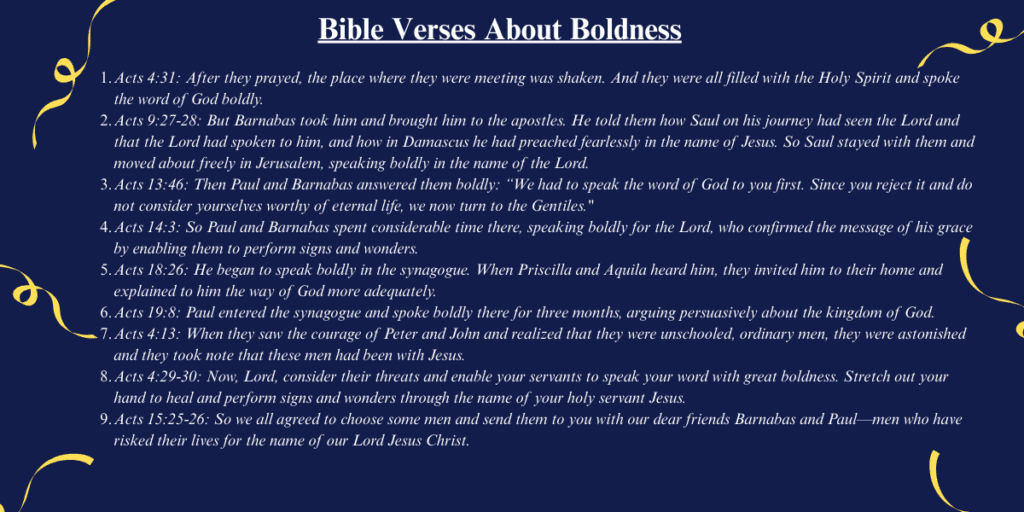
Acts 4:31
After they prayed, the place where they were meeting was shaken. And they were all filled with the Holy Spirit and spoke the word of God boldly.Acts 9:27-28
But Barnabas took him and brought him to the apostles. He told them how Saul on his journey had seen the Lord and that the Lord had spoken to him, and how in Damascus he had preached fearlessly in the name of Jesus. So Saul stayed with them and moved about freely in Jerusalem, speaking boldly in the name of the Lord.Acts 13:46
Then Paul and Barnabas answered them boldly: “We had to speak the word of God to you first. Since you reject it and do not consider yourselves worthy of eternal life, we now turn to the Gentiles.”Acts 14:3
So Paul and Barnabas spent considerable time there, speaking boldly for the Lord, who confirmed the message of his grace by enabling them to perform signs and wonders.Acts 18:26
He began to speak boldly in the synagogue. When Priscilla and Aquila heard him, they invited him to their home and explained to him the way of God more adequately.Acts 19:8
Paul entered the synagogue and spoke boldly there for three months, arguing persuasively about the kingdom of God.Acts 4:13
When they saw the courage of Peter and John and realized that they were unschooled, ordinary men, they were astonished and they took note that these men had been with Jesus.Acts 4:29-30
Now, Lord, consider their threats and enable your servants to speak your word with great boldness. Stretch out your hand to heal and perform signs and wonders through the name of your holy servant Jesus.Acts 15:25-26
So we all agreed to choose some men and send them to you with our dear friends Barnabas and Paul—men who have risked their lives for the name of our Lord Jesus Christ.Acts 28:31
He proclaimed the kingdom of God and taught about the Lord Jesus Christ—with all boldness and without hindrance!Acts 5:29
Peter and the other apostles replied: “We must obey God rather than human beings!”Acts 9:29
He talked and debated with the Hellenistic Jews, but they tried to kill him.
Boldness is a prominent theme throughout the Bible, particularly in how the early church operated under threats and opposition. After a prayer meeting, where the place was shaken, the believers were filled with the Holy Spirit and spoke the word of God boldly.
This account in Acts highlights the transformational power of divine enablement, where Paul and Barnabas spent a considerable time speaking with boldness in the synagogue, arguing persuasively about the kingdom of God.
Another powerful example is when Peter and John, facing the council, demonstrated boldness despite being unschooled and ordinary men. The council members were astonished and took note that these men had been with Jesus.
This encounter emphasizes the remarkable transformation that comes from being with Christ, showcasing a boldness that is not of human origin. This boldness allowed them to proclaim the Gospel openly and without fear, even when debated by Hellenistic Jews who tried to kill them.
In the meeting where the community prayed, the Lord answered their pleas by enabling them to perform miraculous signs and wonders. This not only confirmed their message but also empowered them anew to speak with great boldness.
When Paul and Barnabas were considered unworthy of eternal life by some, they turned to the Gentiles, illustrating the boldness to reject traditional boundaries and share the Gospel beyond Jewish confines.
The theme of boldness continues with Priscilla and Aquila who invited Apollos into their home and explained to him the way of God more accurately. Apollos, filled with enthusiasm and learning, then preached in Ephesus and Rome with such conviction that he changed many lives.
This sequence of teaching and sharing, risking lives amidst rejection, and the commitment of each believer affirms the power of the Gospel to inspire courage and boldness across the early church, unhindered by threats or human limitations.
Ephesians 3:12, 6:10, 6:19-20: Strength and Boldness through Faith
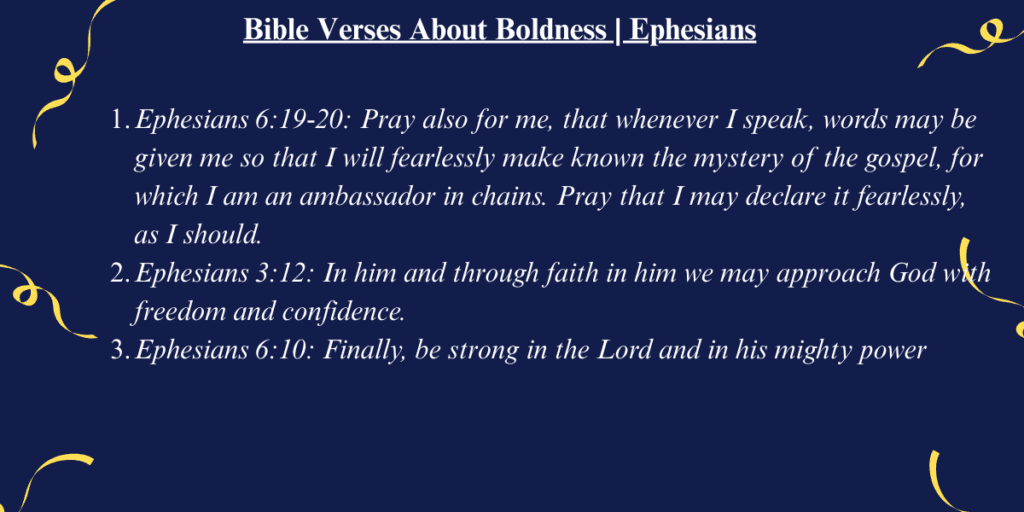
Ephesians 6:19-20
Pray also for me, that whenever I speak, words may be given me so that I will fearlessly make known the mystery of the gospel, for which I am an ambassador in chains. Pray that I may declare it fearlessly, as I should.Ephesians 3:12
In him and through faith in him we may approach God with freedom and confidence.Ephesians 6:10
Finally, be strong in the Lord and in his mighty power.
In Ephesians, the apostle Paul underscores the importance of having confidence and fearlessness when sharing the Gospel. He asks the believers to pray for him, that he may speak boldly as an ambassador in chains, fearlessly making known the mystery of the Gospel.
Despite his chains, Paul shows us that we can approach God with confidence, trusting in His mighty power to grant us the strength to declare His message. Through faith in the Lord, we are empowered to speak His words and fearlessly proclaim His truth to all, whether Jews or Gentiles.
Paul further emphasizes that being strong in the Lord gives us the freedom to boldly declare the Good News. Even in difficult circumstances, we can trust that God grants us the power to witness fearlessly and confidently.
Through faith, we are not only able to make known the mystery of the Gospel, but also to live with the assurance that we have access to God through Christ. This boldness is a reflection of our relationship with the Father, and Paul encourages us to pray for the courage to speak words that will bring others into His kingdom.
Hebrews 4:16, 10:1, 10:19, 13:6: Confidence in Divine Grace and Assistance
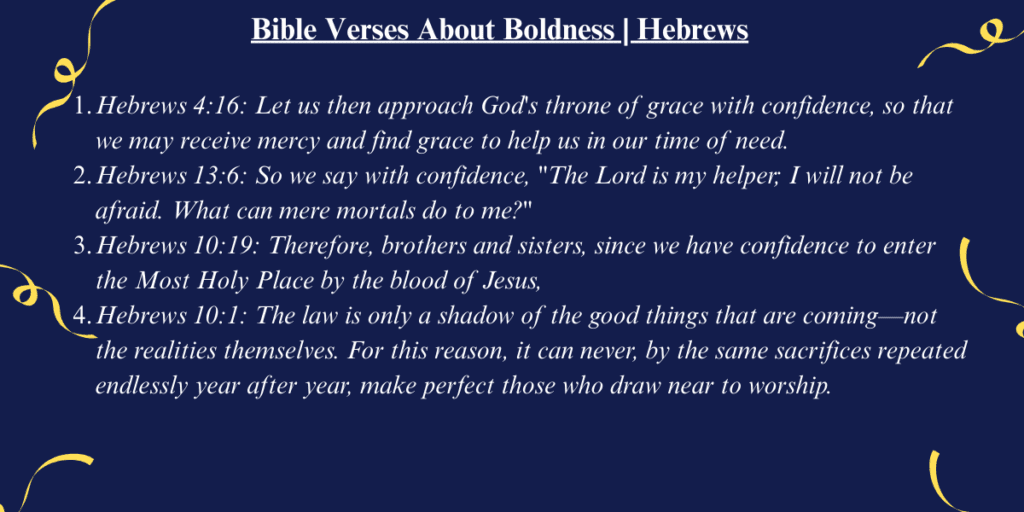
Hebrews 4:16
Let us then approach God’s throne of grace with confidence, so that we may receive mercy and find grace to help us in our time of need.Hebrews 13:6
So we say with confidence, “The Lord is my helper; I will not be afraid. What can mere mortals do to me?”Hebrews 10:19
Therefore, brothers and sisters, since we have confidence to enter the Most Holy Place by the blood of Jesus,Hebrews 10:1
The law is only a shadow of the good things that are coming—not the realities themselves. For this reason, it can never, by the same sacrifices repeated endlessly year after year, make perfect those who draw near to worship.
In the book of Hebrews, believers are encouraged to approach God’s throne with confidence, knowing that through the blood of Jesus, we can enter the Most Holy Place. This passage assures us that we can draw near to God without fear, because of the grace and mercy we receive from Him.
Unlike the old law, which required sacrifices that were repeated endlessly, Jesus’ sacrifice was perfect, and by it, we are made perfect. In times of need, we can find help and receive the strength we need to face life’s challenges. The verse reminds us that we have confidence to approach God as our helper, and we can always say, “Lord, I am not afraid,” no matter the situation.
This boldness also gives us confidence to worship and live out our faith without being afraid or uncertain. Hebrews speaks of the boldness to declare the gospel, even when facing opposition. It encourages believers to embody faith in their relationship with God, knowing He is the Lord who helps us.
Even though we are mere mortals, God invites us to come before Him with boldness—we are not afraid because we have access to His grace and mercy. This passage is a powerful reminder that we can approach the Lord at any time, in any circumstance, and know that He will give us what we need in our journey of faith.
2 Timothy 1:7: Empowered by the Spirit for Courage and Self-Discipline

2 Timothy 1:7
For the Spirit God gave us does not make us timid, but gives us power, love, and self-discipline.
In 2 Timothy, Paul reminds Timothy that the Spirit God gave him is not a spirit of timidity, but one of power, love, and self-discipline. He emphasizes that God has given believers the strength to live boldly, without fear, because the Holy Spirit empowers us to overcome any challenges or doubts.
Paul encourages Timothy to embrace this call and not be timid, for the Spirit that was given is full of courage and the ability to speak and act with confidence, knowing that we are empowered by God’s divine presence.
1 John 4:17-18, 5:14-15: Confidence and Fearlessness Rooted in Perfect Love

1 John 4:17-18
This is how love is made complete among us so that we will have confidence on the day of judgment: In this world we are like Jesus. There is no fear in love. But perfect love drives out fear, because fear has to do with punishment. The one who fears is not made perfect in love.1 John 4:18
There is no fear in love. But perfect love drives out fear, because fear has to do with punishment. The one who fears is not made perfect in love.1 John 5:14
This is the confidence we have in approaching God: that if we ask anything according to his will, he hears us.1 John 5:15
And if we know that he hears us—whatever we ask—we know that we have what we asked of him.
In 1 John, we are reminded that perfect love from God gives us the confidence to live boldly without fear. When we are rooted in this love, it empowers us to approach God with a heart full of confidence, knowing that He hears our prayers and will give us what we ask for, as long as it pleases Him. This love is so powerful that it expels fear and punishment, allowing us to stand before God with confidence, knowing that we are fully loved. The perfect love we experience through Him also manifests in our relationships with the world, showing others the same love that we have received.
Proverbs 3:25-26, 14:26, 28:1, 29:25: Righteous Boldness and Divine Protection
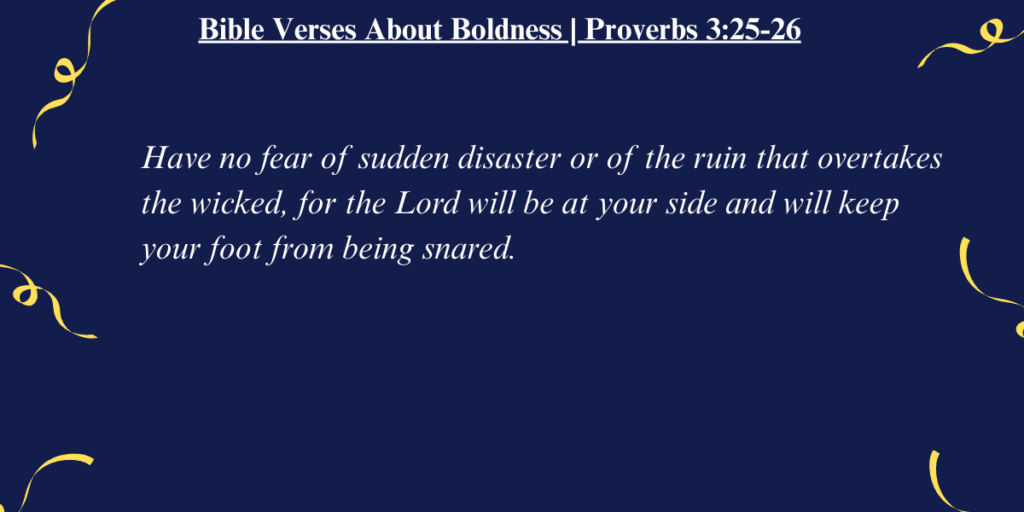
Proverbs 28:1
The wicked flee though no one pursues, but the righteous are as bold as a lion.Proverbs 14:26
Whoever fears the Lord has a secure fortress, and for their children it will be a refuge.Proverbs 3:25-26
Have no fear of sudden disaster or of the ruin that overtakes the wicked, for the Lord will be at your side and will keep your foot from being snared.Proverbs 29:25
The fear of man lays a snare, but whoever trusts in the Lord is safe.
In the book of Proverbs, Solomon contrasts the boldness of the righteous with the fearfulness of the wicked. A key proverb celebrates how the righteous are like a lion—they are bold, not afraid of sudden disaster or destruction that may come. This boldness comes from a deep relationship with God and a reverence for the LORD, which provides them with security.
The righteous are like a fortress, knowing that their confidence is grounded in their trust in God. In contrast, the wicked flee because they are afraid, and they have no security when dangerous situations arise. They are like people caught in a trap, not knowing where to run, while the righteous can stand firm, trusting that God will protect them.
Proverbs teaches that boldness is rooted in faith and trust in God. The LORD provides refuge for His children, a place of safety where they are not afraid of the wicked or anything that might come their way. The righteous have a foundation of confidence, knowing that with God on their side, they are always secure. This boldness is not about bravado, but about true courage that comes from understanding that the LORD is their refuge and safety.
Philippians 1:1, 1:14, 1:20, 1:28: Unwavering Courage and Confidence in Christ
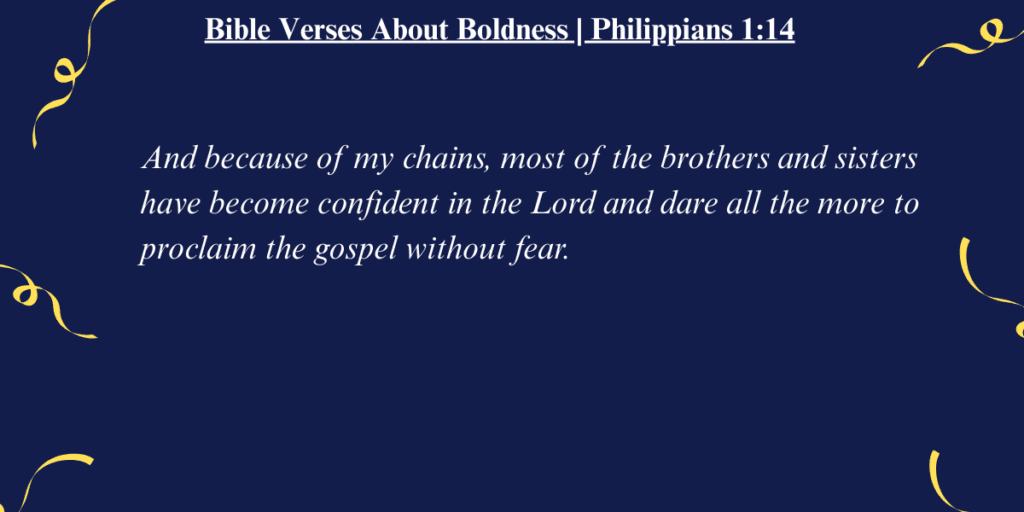
Philippians 1:14
And because of my chains, most of the brothers and sisters have become confident in the Lord and dare all the more to proclaim the gospel without fear.Philippians 1:20
I eagerly expect and hope that I will in no way be ashamed, but will have sufficient courage so that now as always Christ will be exalted in my body, whether by life or by death.Philippians 1:28
Without being frightened in any way by those who oppose you. This is a sign to them that they will be destroyed, but that you will be saved—and that by God.Philippians 1:1
Paul and Timothy, servants of Christ Jesus, to all God’s holy people in Christ Jesus at Philippi, together with the overseers and deacons:
In Philippians, Paul speaks to the believers in Philippi, including the overseers and deacons, about living boldly in the face of adversity. He expresses his hope and desire for Christ to be exalted through his body, whether in life or death.
Paul emphasizes that we should never be ashamed, but instead, we should embrace courage and boldness, even when facing challenges. He is not frightened by his imprisonment or the circumstances around him because he is rooted in his faith in God and empowered by the Holy Spirit.
This boldness is a result of trusting in God to strengthen and motivate him to proclaim the Gospel, no matter how others may oppose him. Paul encourages the church to continue to practice love for others, to resolve to bring honor to God, and to always glorify Christ in their actions. He affirms that through this, they will be saved, and their lives will be a sign of God’s love for the world.
Romans 1:16, 15:15-16: Bold Proclamation of the Gospel to All Nations
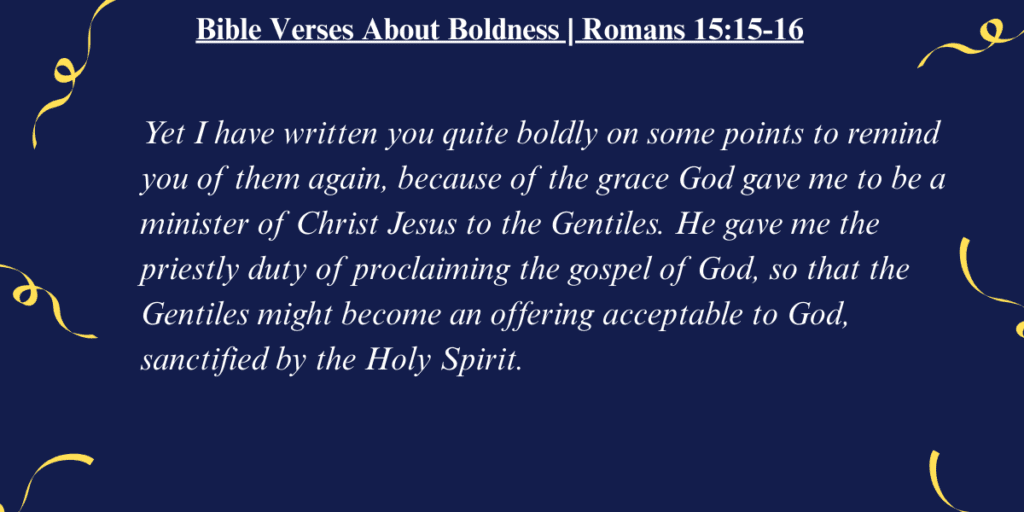
Romans 15:15-16
Yet I have written you quite boldly on some points to remind you of them again, because of the grace God gave me to be a minister of Christ Jesus to the Gentiles. He gave me the priestly duty of proclaiming the gospel of God, so that the Gentiles might become an offering acceptable to God, sanctified by the Holy Spirit.Romans 1:16
For I am not ashamed of the gospel, because it is the power of God that brings salvation to everyone who believes: first to the Jew, then to the Gentile.
In Romans, Paul writes with boldness, expressing that he is not ashamed of the Gospel because it is the power of God for the salvation of everyone who believes, whether Jew or Gentile. Paul’s commitment as an apostle is driven by the grace of God, and he is empowered by the Holy Spirit to share the Good News of Christ.
His calling is to boldly proclaim the work of saving faith that transforms lives. Paul urges believers to never shy away from this powerful Gospel, knowing that it is through Christ that all people can be saved and made new.
Psalm 27:1, 27:14, 31:24, 118:6, 138:3: Strength and Courage from the Lord’s Presence
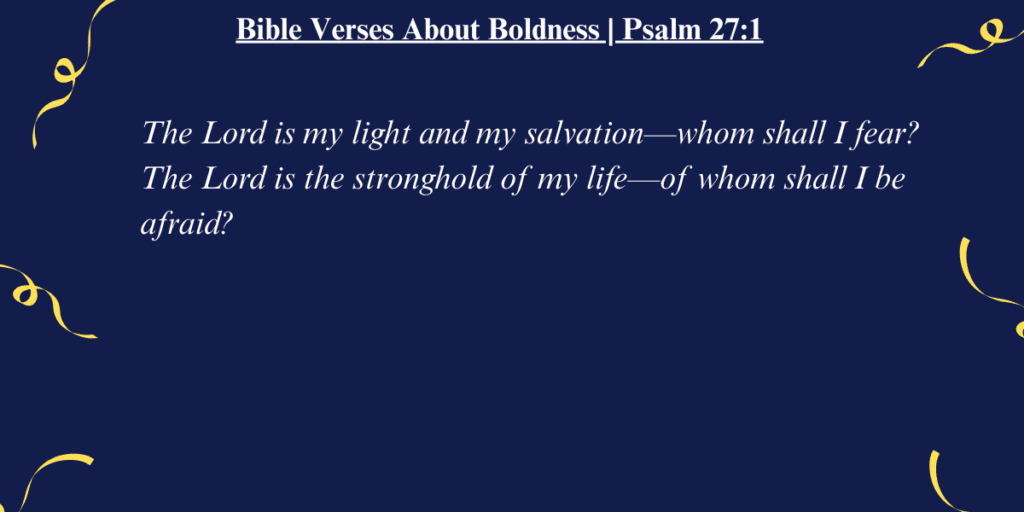
Psalm 138:3
When I called, you answered me; you greatly emboldened me.Psalm 27:14
Wait for the Lord; be strong and take heart and wait for the Lord.Psalm 27:1
The Lord is my light and my salvation—whom shall I fear? The Lord is the stronghold of my life—of whom shall I be afraid?Psalm 31:24
Be strong and take heart, all you who hope in the Lord.Psalm 118:6
The Lord is with me; I will not be afraid. What can mere mortals do to me?
In the Psalm, David expresses how he was greatly emboldened when he called on the LORD and His answering brought him inner strength. David writes about how the LORD is his fortress, a strong and secure place, protecting him from danger. With God’s help, he found the courage to be bold in the face of fear, knowing that the LORD is his light and salvation.
Even when surrounded by people who caused him to tremble, he chose to trust in God, knowing that the LORD would provide the strength and empowerment he needed. He was no longer afraid, because his hope was rooted in God’s ability to answer and protect him in all circumstances, making him strong and courageous.
Daniel 3:16-18, 10:19: Bold Faith and Divine Strength in the Face of Fear
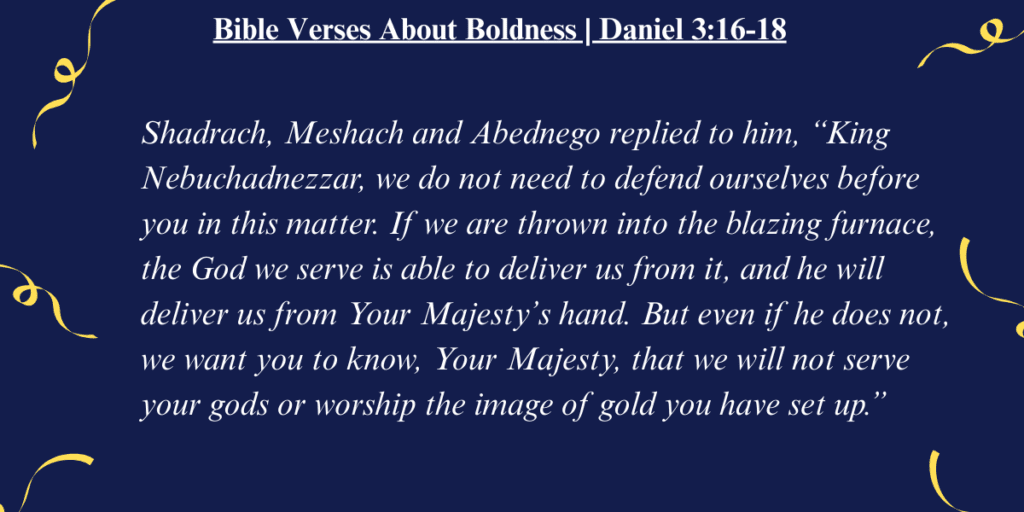
Daniel 3:16-18
Shadrach, Meshach and Abednego replied to him, “King Nebuchadnezzar, we do not need to defend ourselves before you in this matter. If we are thrown into the blazing furnace, the God we serve is able to deliver us from it, and he will deliver us from Your Majesty’s hand. But even if he does not, we want you to know, Your Majesty, that we will not serve your gods or worship the image of gold you have set up.”Daniel 10:19
“Do not be afraid, you who are highly esteemed,” he said. “Peace! Be strong now; be strong.” When he spoke to me, I was strengthened and said, “Speak, my lord, since you have given me strength.”
In the story of Daniel, his boldness and unwavering faith in God are truly remarkable. Along with his friends, he faced an immense threat of death for refusing to worship false gods. Despite the persecution, Daniel remained strong and unafraid, knowing that his faith in God would bring him peace. In the face of this danger, he was encouraged and strengthened, suddenly feeling a stronger sense of courage.
His friends followed his example, boldly declaring their faith and speaking words of confidence, trusting that God would protect them. Daniel’s story shows us the power of boldness that comes from knowing God’s presence and His ability to give courage even in the most challenging moments, when the threat of death seems overwhelming.
Joshua 1:7-9: Strength and Courage in God’s Command
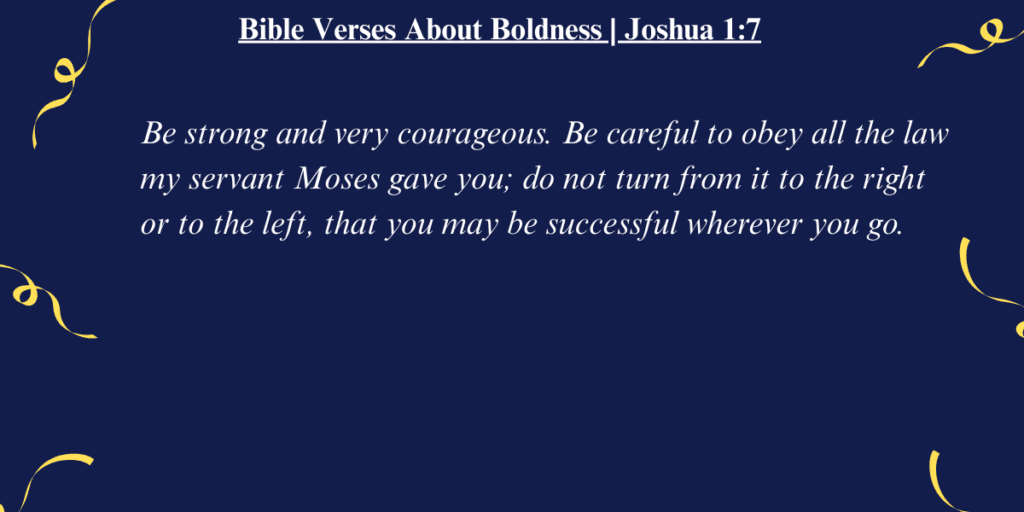
Joshua 1:9
Have I not commanded you? Be strong and courageous. Do not be afraid; do not be discouraged, for the Lord your God will be with you wherever you go.Joshua 1:7
Be strong and very courageous. Be careful to obey all the law my servant Moses gave you; do not turn from it to the right or to the left, that you may be successful wherever you go.
In the book of Joshua, God gives a powerful reminder to Joshua as he steps into Moses’s leadership, instructing him to be strong and courageous. God commands him to be careful to obey the law and to follow His command without turning to the right or left, ensuring that wherever he goes, he will be successful.
Joshua is reminded that with God’s presence and guidance, he will have the boldness needed to lead Israel. This call to boldness emphasizes the importance of staying true to God’s direction, knowing that His power will make him successful in all his leadership efforts. Joshua’s journey shows that true boldness comes from God’s constant presence and His powerful support in every step of the way.
1 Thessalonians 2:2: Boldness in Proclaiming the Gospel Amidst Opposition
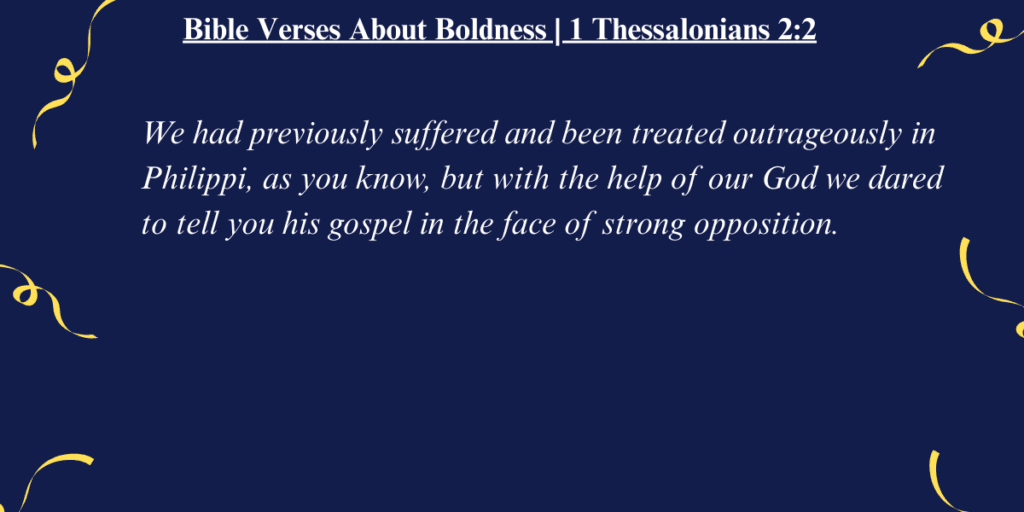
1 Thessalonians 2:2
We had previously suffered and been treated outrageously in Philippi, as you know, but with the help of our God we dared to tell you his gospel in the face of strong opposition.
In 1 Thessalonians, Paul reminds the believers that despite having been treated outrageously and having suffered in Philippi, they did not shrink back but boldly dared to tell the Gospel in the face of strong opposition. Just as the apostles showed boldness in their suffering, the Thessalonians were called to have the same courage and conviction in their faith.
Paul speaks of their example, emphasizing how trust in God gives them the strength to face conflict and continue spreading the message of God’s truth, no matter the challenges. Through this, they learn that boldness in suffering is not just about physical strength, but about trusting in God to give them the courage needed to endure and keep proclaiming the Gospel.
Mark 5:36, 15:43: Bold Faith and Trust in God’s Power
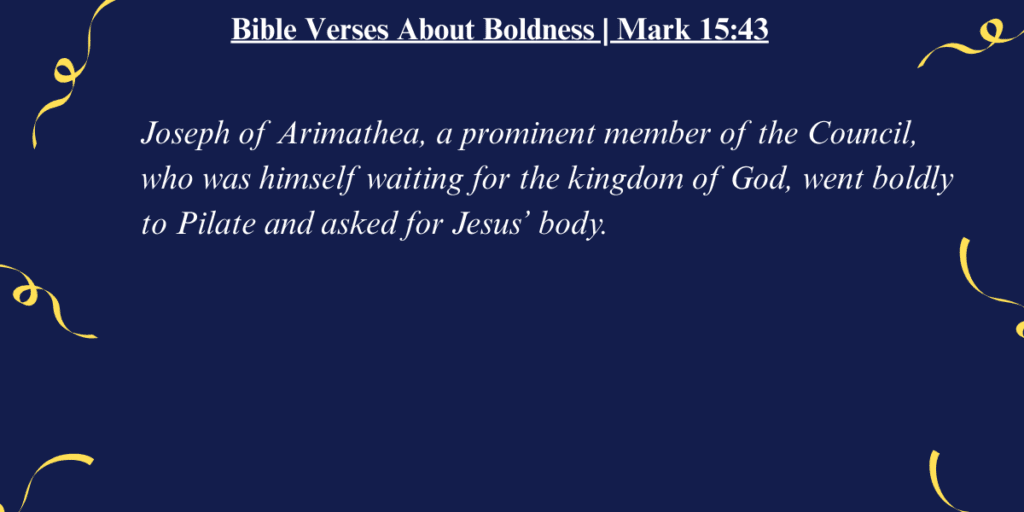
Mark 15:43
Joseph of Arimathea, a prominent member of the Council, who was himself waiting for the kingdom of God, went boldly to Pilate and asked for Jesus’ body.Mark 5:36
Overhearing what they said, Jesus told him, “Don’t be afraid; just believe.”
In 1 Thessalonians, we see an example of boldness in the actions of Joseph of Arimathea, a prominent member of the Council who was not afraid to take a stand for his belief in Jesus. Despite the fear of others, Joseph boldly went to Pilate and asked for the body of Jesus, showing immense courage and conviction.
Even though others were waiting for a Messiah who would bring the kingdom of God, Joseph’s boldness was a testament to his faith and belief in the true kingdom that Jesus proclaimed. The act of overhearing the gospel and believing in Jesus led him to take this courageous step. His example of boldness shows that true faith and trust in God can move us to act, even when the cost is great.
Philemon 1:8: Boldness in Christ to Urge Righteous Action

Philemon 1:8
Therefore, although in Christ I could be bold and order you to do what you ought to do,
In Philemon, Paul speaks with boldness, reminding Philemon that as a servant of Christ, he ought to act in a way that honors Christ’s teachings. Paul encourages him to accept Onesimus, not just as a servant, but as a brother in the faith. By doing so, Philemon would show the world the true order of Christian love and forgiveness, standing as a powerful example of how Christ’s love transforms relationships.
Genesis 18:22-32: Abraham’s Bold Intercession for Sodom
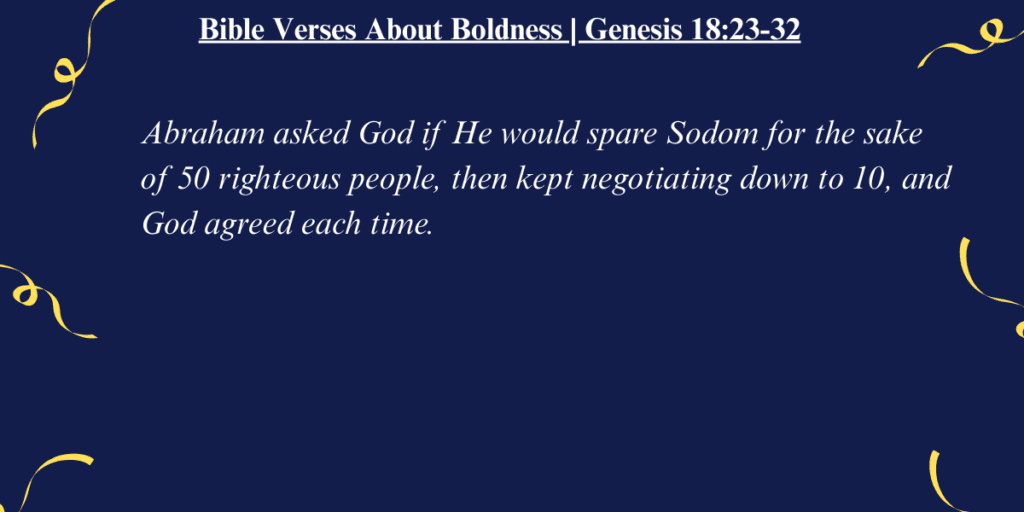
Genesis 18:23-32
Abraham asked God if He would spare Sodom for the sake of 50 righteous people, then kept negotiating down to 10, and God agreed each time.Genesis 18:22-32
Abraham pleaded with God to spare Sodom, starting with 50 righteous people and working down to 10. Each time, God agreed.
In Genesis, Abraham demonstrates incredible boldness when he approaches the LORD to speak on behalf of the people of Sodom. God had revealed His plan to sweep away the wicked from the city, and Abraham, knowing there were still righteous people there, boldly asks, “Will You really destroy the righteous along with the wicked?” He continues to speak to the LORD, asking if the city could be spared for the sake of fifty righteous people.
When God agrees, Abraham continues, requesting for the city to be spared for forty-five, forty, thirty, twenty, and even ten. His persistence shows boldness in seeking mercy for the righteous, all the while trusting that God would find a way to spare the city if the righteous were present.
Despite his status as just dust and ashes, Abraham boldly speaks, trusting that God, the true Judge of the earth, would do what is right and not destroy the whole city for the lack of a few righteous people.
This conversation between Abraham and God reveals that boldness before the Lord is not about demanding answers, but about trusting that God will act justly.
Even when facing the anger of God’s judgment, Abraham shows courage and conviction by asking the LORD to consider the righteous. His willingness to speak for others shows how boldness and trust in God go hand in hand, allowing him to challenge the LORD in a humble yet bold way.
In Genesis, Abraham shows great boldness when he remains standing before the LORD and approaches Him with a request to spare Sodom. God had revealed that He would sweep the city for its wickedness, but Abraham boldly speaks up, asking if God would really sweep away the righteous along with the wicked.
With great courage, he says that if fifty righteous people could be found in the city, would God spare it? When God agrees, Abraham continues to speak, lowering the number from fifty to forty-five, then forty, thirty, and so on, asking if God would spare the city for the sake of the righteous.
His boldness is clear as he humbly but persistently speaks to the Judge of the earth, trusting that God will always do what is right. Even though Abraham is just dust and ashes, he confidently asks for mercy, showing that boldness in faith is about trusting in God’s ability to act justly, even when faced with anger or judgment.
John 4:17, 7:26, 14:27, 16:33: Christ’s Assurance of Truth and Peace

John 4:17
“I have no husband,” she replied. Jesus said to her, “You are right when you say you have no husband.”John 14:27
“Peace I leave with you; my peace I give you. I do not give to you as the world gives. Do not let your hearts be troubled and do not be afraid.”John 7:26
Here he is, speaking publicly, and they are not saying a word to him. Have the authorities really concluded that he is the Messiah?John 16:33
“I have told you these things, so that in me you may have peace. In this world you will have trouble. But take heart! I have overcome the world.”
In the book of John, Jesus offers a message of peace and boldness to His disciples, knowing that they would soon face trials and sorrows. He replied to them, telling them not to be afraid or let their hearts be troubled because He has overcome the world.
Jesus speaks directly to His followers, reassuring them that despite the many challenges and opposition they will face, He has already conquered the world. His words bring comfort, reminding them that they are not alone and that He is always with them.
Jesus’s assurance that peace is given not as the world gives it, but in a way that transcends their understanding, fills them with strength to keep moving forward. When faced with the authorities and publicly speaking, Jesus encourages His followers to take heart and trust in His peace, which will help them face anything that comes their way.
1 Timothy 3:1, 3:13: The Noble Calling and Assurance of Faith in Christ
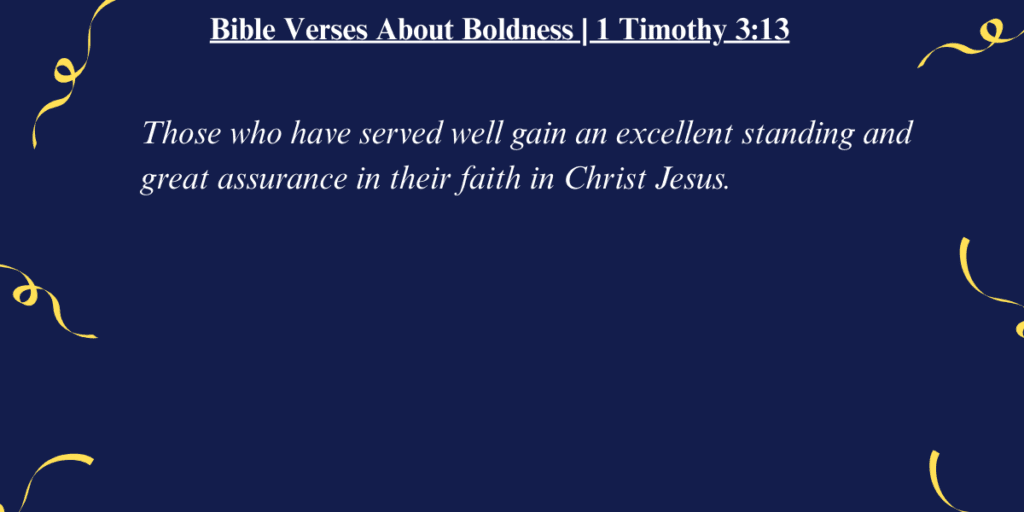
1 Timothy 3:13
Those who have served well gain an excellent standing and great assurance in their faith in Christ Jesus.1 Timothy 3:1
Here is a trustworthy saying: Whoever aspires to be an overseer desires a noble task.
In 1 Timothy, Paul speaks about the importance of being trustworthy in the role of an overseer and how it is a noble and great task to serve God. He desires for those who aspire to lead to do so with excellent character and to serve well, as this demonstrates their faith in Christ Jesus.
The role of an overseer requires great responsibility and the ability to maintain faith while showing assurance in their service. Paul encourages that trustworthy leaders are those who live out their faith with integrity, knowing that they will gain a good standing in the church and receive the respect and admiration of others for their leadership.
1 Corinthians 3:12, 15:58, 16:13: Standing Firm in Faith and Courageous Labor for the Lord
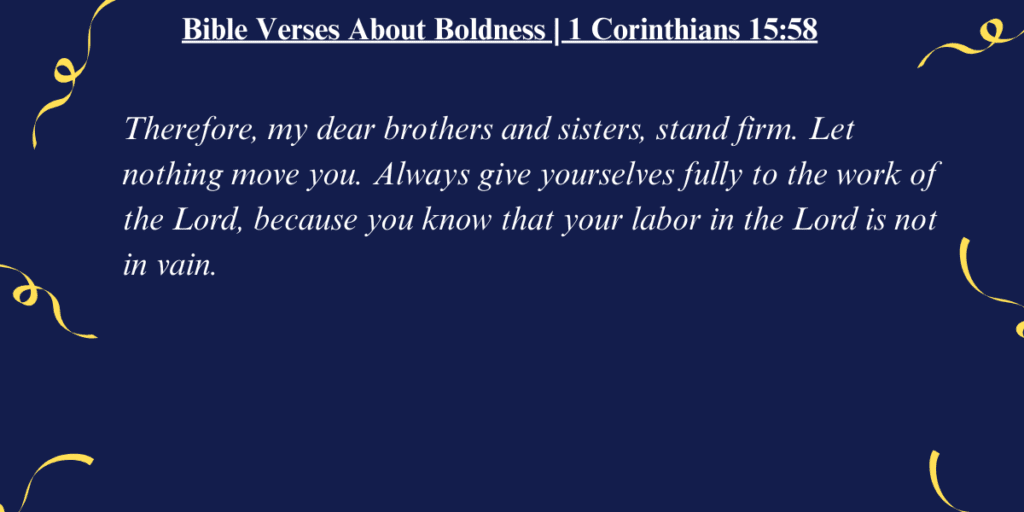
1 Corinthians 3:12
If anyone builds on this foundation using gold, silver, costly stones, wood, hay or straw,1 Corinthians 16:13
Be on your guard; stand firm in the faith; be courageous; be strong.1 Corinthians 15:58
Therefore, my dear brothers and sisters, stand firm. Let nothing move you. Always give yourselves fully to the work of the Lord, because you know that your labor in the Lord is not in vain.
In 1 Corinthians, Paul encourages the brothers and sisters in the faith to stand firm and be courageous in their faith. He reminds them that, as they work for the Lord, their labor is not in vain, for they are building upon the foundation of Christ.
This foundation is strong, unlike wood, hay, or straw, which are easily destroyed. Instead, it is made of gold, silver, and costly stones, representing the eternal value of their work for God. Paul urges them to be strong and not be swayed, as their efforts in spreading the Gospel will stand the test of time and bring glory to the Lord.
1 Peter 3:14, 5:10: Strength and Blessing in the Midst of Suffering
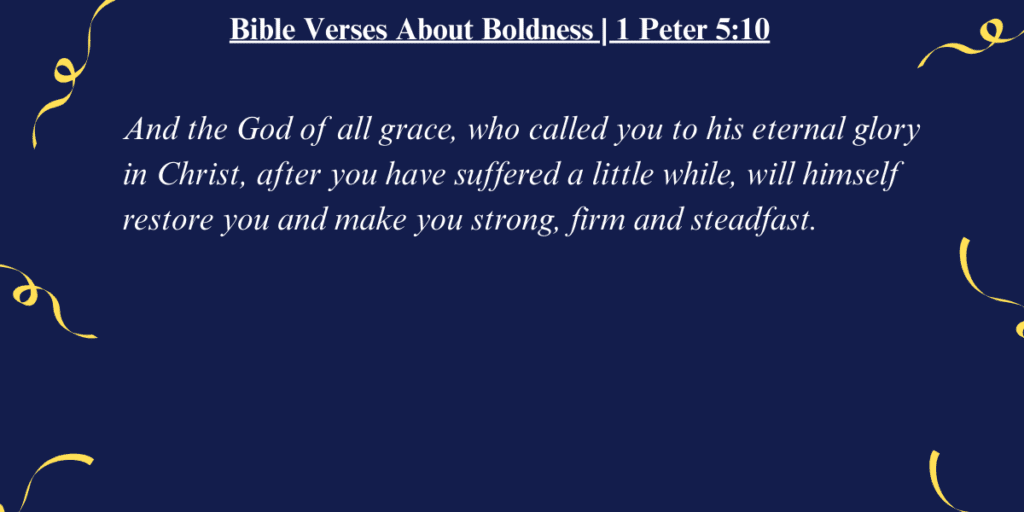
1 Peter 5:10
And the God of all grace, who called you to his eternal glory in Christ, after you have suffered a little while, will himself restore you and make you strong, firm and steadfast.1 Peter 3:14
But even if you should suffer for what is right, you are blessed. “Do not fear their threats; do not be frightened.”
In 1 Peter, we are reminded that God has called us to a life of boldness, even in the face of threats and suffering. Though we may endure little suffering now, it is for the sake of Christ, and it is through this suffering that we are made strong, firm, and steadfast in our faith.
Peter encourages us that we should not worry or be afraid, as God’s grace will restore and strengthen us, and He will reward us with eternal glory. Even though Christ suffered for us, we are called to follow His example, trusting that our faith in Him will bring us ultimate reward and glory, as we remain steadfast in His promises.
Isaiah 12:2, 41:10, 54:4: Fearless Trust in God’s Salvation and Strength
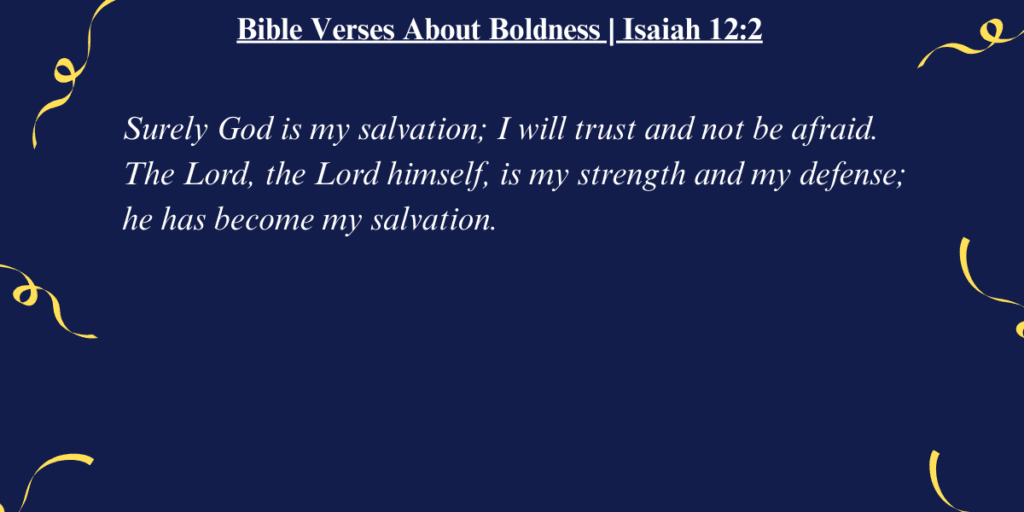
Isaiah 54:4
“Do not be afraid; you will not be put to shame. Do not fear disgrace; you will not be humiliated. You will forget the shame of your youth and remember no more the reproach of your widowhood.”Isaiah 12:2
Surely God is my salvation; I will trust and not be afraid. The Lord, the Lord himself, is my strength and my defense; he has become my salvation.Isaiah 41:10
So do not fear, for I am with you; do not be dismayed, for I am your God. I will strengthen you and help you; I will uphold you with my righteous right hand.
In Isaiah, God promises that those who may feel afraid, humiliated, or discouraged will no longer live in shame or fear. He says that He will strengthen and help them, holding them with His right hand. Even those who have faced reproach, like those in widowhood, will not be put to shame.
God assures us that He will save and restore us, so we will no longer feel the sting of sorrow or disgrace. He reminds us to trust in Him, and He will give us the strength to become victorious.
He will be our song, filling our hearts with peace and joy, knowing that we are no longer defined by our past fear or shame. Instead, we can live confidently with the Lord, who will ensure that we are not afraid and that our future is secure in His victory.
Luke 12:32: Divine Assurance of the Kingdom to the Faithful
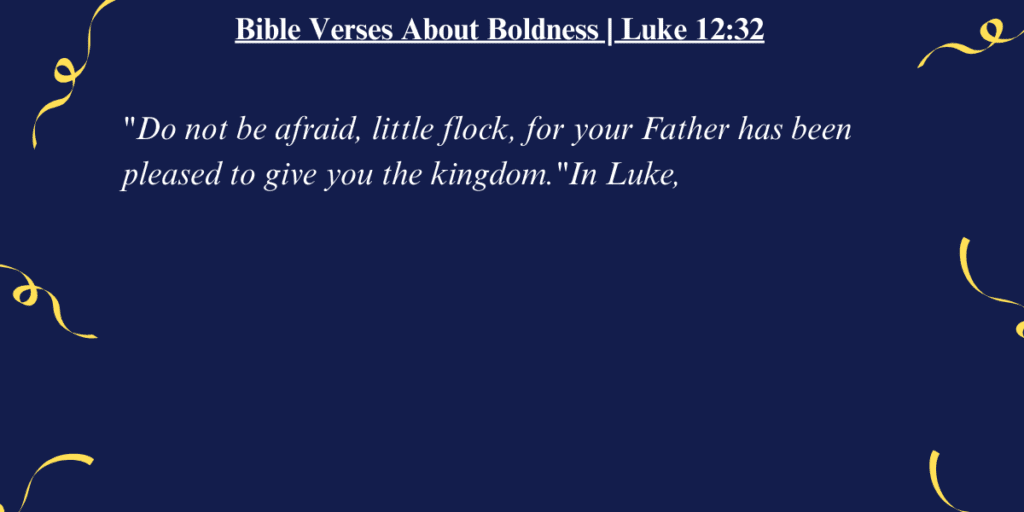
Luke 12:32
“Do not be afraid, little flock, for your Father has been pleased to give you the kingdom.”In Luke,
Jesus tells His little flock not to be afraid, for the Father gives them the great gift of the Kingdom. He promises that God will give them what they need, bringing them happiness and assurance that their trust in Him will never be in vain. This call to boldness reminds us that God provides for those who follow Him, encouraging us to stand firm in our faith without fear.
1 Chronicles 28:20: Encouragement and Divine Support for Solomon’s Task

1 Chronicles 28:20
David also said to Solomon his son, “Be strong and courageous, and do the work. Do not be afraid or discouraged, for the Lord God, my God, is with you. He will not fail you or forsake you until all the work for the service of the temple of the Lord is finished.”
In 1 Chronicles, David encourages his son Solomon to be strong and courageous as he takes on the work of building the temple for the LORD. He reminds him not to be afraid or discouraged, for God is with him and will not forsake him. David assures Solomon that if he trusts in the LORD, his service will not fail, and the temple will be finished according to God’s plan.
What is Boldness?
Boldness is the willingness to take risks and act with confidence and courage, even when faced with danger or potential challenges. According to the Oxford and Merriam-Webster dictionaries, it is often associated with being fearless and adventurous, standing prominently in situations where others might hesitate.
However, boldness can also carry negative connotations, such as arrogance or disrespectful behavior, especially when it becomes self-serving or rude. While boldness is about having the audacity to move forward with conviction, it should not cross into improperness or disagreeableness, especially in the way we say or treat others.
As God calls us to be bold, we are encouraged to stand with confidence but always with humility, guided by the right motives rather than being conceited or dangerous.
But a Boldness that Comes From and is Centered on God?
Boldness that is rooted in God is not about fierce arrogance but about true courage and the confidence that comes from knowing our identity in Him. This boldness comes from God’s grace, His love, and His protection, which give us the strength to move forward in purpose and for His glory.
It’s a boldness that doesn’t lack fear but rather overcomes it, because we know that we are not alone in the challenges we face. With absolute confidence in God, we can pursue what is right without the shame of failure, trusting that we will never fail as long as we are walking in His will. This kind of boldness is kind and focused on pursuing God’s plans, not on seeking personal worth or recognition.
What does the Bible say about Being Bold?
Let’s dig into the scriptures and understand how the Bible defines boldness. According to 2 Timothy, God gave us a Spirit not of being timid, but one of power, love, and self-discipline. This verse sums up the heart of biblical boldness—it’s not fueled by fear, but by divine confidence, empowerment, and self-control.
God supplies every ability we need to live out our calling, and His Spirit gives us the might to face challenges with courage. We are also told to check our motives so our bold actions never turn into self-centeredness.
In Acts 4:13 and Acts 4:31, the NIV translation shows how unschooled, ordinary people were emboldened by the Spirit to preach Christ boldly. These people didn’t rely on training but on the power of the Spirit.
Their confidence came from knowing they were called, and their courage was a response to God who answered their prayers. In Psalm 138:4, King David declared how all kings would praise God when they heard His words, showing that true boldness comes when we rely on the Source of our strength.
David knew his help, his confidence, and his supply did not lack—because God alone is enough. That is the real forkboldness: a divine turning point where fear is replaced by trust.
Paul teaches further in his ministry that the law brought condemnation, but the glorious ministry of the Spirit brought even more righteousness. The glory of the old covenant was glorious, but now, in comparison, the surpassing glory of grace is what matters.
The law was transitory, but what came through Christ is greater, lasts, and fills us with hope. In this truth, we are called to be bold, and Paul reminds us that we are no longer subject to the law but are free under grace.
Our righteousness in Christ makes us confident and bold, able to make wise decisions and take faithful actions. As chapter and verse 17 say, “Where the Spirit of the Lord is, there is freedom”—and this is where true boldness is transformed to look like Christ.
In Proverbs, it says the wicked flee though no one pursues, but the righteous are as bold as a lion. This kind of boldness is not self-supplied, because what is self-supplied eventually runs out and can quickly lead to ruin. Biblical confidence is built on God, our solid ground.
We must remember that boldness is complete only when it is shaped by the Spirit, filled with love, and governed by self-control. It does not mean arrogance, superiority, or taking action without regard for others. In Corinthians 13:4-8, we see that love, just like boldness, must line up with the fruit of the Spirit. Boldness without love isn’t holy—it’s hollow. But boldness grounded in truth and grace? That’s the boldness God desires.
How to Grow in Boldness?
To grow in boldness, it’s important to take risks in your faith and trust that God will help you step out with confidence. Godly boldness doesn’t come from relying on our own strength but from relying on God’s power.
As you grow in your faith, God will give you the boldness to take risks for His glory. Practices such as prayer, reading the Bible, and seeking His guidance will help you grow stronger and more confident in your ability to face challenges.
By taking these steps and trusting in His promises, your faith will continue to grow, making you more able to take risks for His Kingdom. The more you grow, the more boldness you’ll have to step out in faith and pursue God’s glory.
-
Pray confident and specific prayers.
In Hebrews 4:16, we are encouraged to approach God with confidence, knowing that He is ready to listen when we pray. Jesus teaches us to pray confidently, not in a timid or general way, but with specific requests. God wants us to be clear about what we are asking for, even when it’s hard to know exactly what we need.
Jesus reminds us that specific prayers are important, and He encourages us not to be discouraged if things don’t happen immediately. We are to pray confidently, understanding that even if we don’t see immediate results, God is always at work in His perfect timing.
Praying with confidence helps us approach God like a friend, trusting that He listens to each specific prayer we offer, and He responds according to His will. Jesus also assures us that God will not ignore our requests, no matter how specific or general they may be.
-
Carry God’s promises with you
In 1 Kings 8:56 and Joshua 21:45, we are reminded that God’s promises fail not, and His word will always come to pass. Whenever we feel faltering or unsure, it’s important to refer to His steadfast promises and carry them with us.
God’s promises give us the confidence to face any situation, knowing that His promises will never fail. When we hope for the right results but feel discouraged, we can memorize and hold His promises close to our heart, knowing that they will come to fruition, even if they don’t happen immediately.
Let these promises remind you again and again that God’s word is steadfast, and you can rely on them without faltering, regardless of the circumstances.
-
Take secret steps of faith
True boldness in faith often starts in private moments where God can operate without the need for self-display. God knows our hearts, and when we take secret steps of faith, such as through personal prayer, fasting, or serving others in quiet ways, we allow His glory to shine through us.
These practices, done in secret, help us rely on God, allowing us to grow in faith. It’s through these private moments that our boldness is shaped, as we set goals to serve others without seeking recognition. God is pleased when we act in ways that glorify Him without seeking self-glory.
Whether it’s a bold prayer or a personal act of service, God sees our faith and rewards us for our boldness. In these moments, we tell our story of faith, knowing that God will be glorified in private acts as much as in public boldness.
-
Catalogue and celebrate blessings
As we move forward in our journey with God, it’s important to look back and see the many ways He has come through for us. Just as the Israelites were called to hold feasts and festivals as intentional times of remembrance and gratitude, we too are prompted to take time to celebrate God’s blessings.
These moments help us stay the course, especially when we feel fearful or unsure. By reflecting on the ways God has shown His confidence in us and helped us in the past, we are convinced that He will continue to guide us forward.
Gratitude and celebration serve as powerful reminders that, even in hard times, God is always faithful, and we can move forward with confidence in His continued provision.
FAQs
What does God say about Boldness?
God encourages believers to have boldness in their faith, trusting that the Holy Spirit empowers and enables them to be courageous in their actions. In Acts 1:8, Jesus promises that the Holy Spirit will give confidence and assurance, equipping believers to be effective witnesses of the gospel. Acts 4:31 shows how the apostles, filled with the Holy Spirit, were bold in preaching and sharing the message of Christ.
Ephesians 6:19-20 and Philippians 1:14 also emphasize the importance of boldness in spreading the gospel, reminding us that it is through courage and confidence in the Spirit that we can boldly speak and live for Christ. God calls us to live with boldness, knowing that the Holy Spirit gives us the strength and courage to face challenges and witness effectively for the gospel.
What does Proverbs say about Boldness?
In Proverbs 28:1, it is written that the righteous are bold like a lion. This boldness comes from their righteousness, as they are not bound by guilt or condemnation. When we live in righteousness, we can approach life with the courage and boldness of a lion, even when we feel unsure or intimidated.
Proverbs teaches that boldness is a result of trusting in God and taking bold steps despite doubtful or fearful feelings. When we live in righteousness, we can confidently face challenges, knowing that guilt no longer has power over us, and we can boldly move forward without hesitation.
What is the Psalm of Boldness?
Psalm 138 is a bold declaration of trust in God, where the psalmist calls out to God and confidently believes that He will answer. It emphasizes being stouthearted in faith, knowing that God is always there to provide strength and courage. This psalm encourages us to approach God with boldness, assured that He hears us and will respond to our prayers.
What is Philippians 4:13?
Philippians 4:13 states that we can do all things through Christ, who strengthens us. This verse emphasizes that God provides the strength and ability to overcome any challenges, not relying on oneself, but on the power of Christ. It is a reminder that with Christ’s help, we are empowered to face and conquer anything that comes our way.
